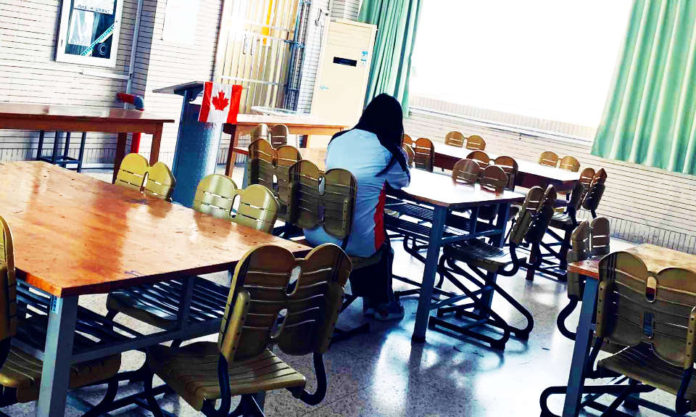“My parents, who are doctors, say that the ‘pneumonia’ is more serious than we think”, said my friend, frowning. It was late January, and she in her face mask looked overcautious beside the fashionable ladies in Xinjiekou, who strode swiftly and laughed without shielding their lips.
Her parents were right. In an urgent phone call 1 or 2 days later, my mother told me that the first case of ‘pneumonia’ had emerged in Nanjing; she warned me against the dire consequence of wandering outside. The outbreak makes our world incredibly narrow, I thought, after reluctantly canceling my jazz drum class and plans to hang out.
To a common high school student, the outbreak was not an acute pang, but a dull one. Its devastating impact never directly intruded into my life. Media tied me to the broader world and at the same time placed me in a vacuum. The intense war against the spreading coronavirus comprised quick flashes on the TV screen; the fluctuating patient population reduced to a scarlet number on the home pages of social media, the anxiety of my parents’ colleagues from Wuhan dissolved into chats at the dinner table.
There were also plenty of news reports, occasionally with rumours sneaked into truthful accounts and considerate suggestion. The virus was playing havoc out there, blurred by distance and lacking a clear view. But in our warm, little world, we did nothing but carry out the heroic mission of keeping ourselves safe.
- A Shop’s Worst Nightmare; Post-Epidemic Retail Down 50 Percent
- Old Man in Wuhan Snapped Viewing Last Sunset Cured of Covid-19
- Opulent Chinese Charter Dreamliner to Bring Kids Back from UK
By mid February, school started online. The outbreak has no doubt influenced not only the form, but also the content of our teaching. In English class, we examined several articles on the coronavirus and discussed their limitations. Indeed, in a time when each side is eager to voice its own opinion, critical thinking is needed.
Though the image of our classmates popped up on the screen from time to time, I still missed the eye contact and whispers we enjoyed in an actual classroom. Electronic devices brought us together but made our connection less intimate. We were sitting in our own bubbles facing electronic screens.
A cleft in the bubble first emerged when our dear AP Psychology teacher bid us an abrupt goodbye. During an ordinary Zoom class, she announced that she could not make it back to China since the border had been closed to foreigners, in fear of imported cases.
- Rocks and Hard Places; A Weird Time for Foreigners in China
- Nice to See You Again! When Can I Take off My Face Mask
- Nanjing-Helsinki Looks Safe but Airlines to Lose US$252 Billion
There have been so many farewells during the outbreak; sad ones, moving ones. I have seen those scenes depicted over and over in the media, but when I was caught up in such a setting I did not know how to react. “That moment, I learned about commoners’ struggle during the outbreak”, one of my classmates later posted on her Wechat moments. The phrase “commoners’ struggle” came upon me with emotional gravity.
Finally, some substantial impact from the outbreak.
It pierced through the safe, drowsy atmosphere that hung around us. That moment, the impossibility of being detached from the outbreak as an individual became increasingly clear.
- Warning by Nanjing Expat Tells West Get Tough or Pay the Price
- East’s Puzzlement at West’s Toilet Paper Panic Buying Explained
- Lifting the Lockdown; the Week Hubei Began Return to Normality
That was how I realised that we are not passively detached like lonely islands during this epidemic. For young commoners like me, the outbreak curtails our connections with friends and the outdoor life, but at the same time it brings our vision to sophisticated issues that befit adulthood.
To me, the outbreak inspires me to consider the fallibility of media representation. To a junior at my school, the innovative medical research done during the outbreak strengthens his determination to be a researcher. To some of my peers, who have been working with charity organisations, the stressful workload is shaping them into capable prospective social workers.
During the outbreak, we may have lost our direction, but we are regaining it with realisation, and essentially, we grow.









